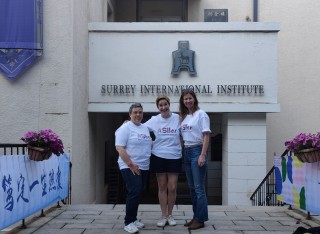
Anna Holland
About
Biography
Anna Holland is an Associate Professor in Management and Deputy Head (Education) for the Digital Economy, Entrepreneurship and Innovation Discipline. Anna's teaching philosophy is grounded in the creation of meaning through active learning and authentic assessment. Her student-centred approach is consistently valued by students, and in 2021 she was awarded the Lynne Milward Award for 'Highly Commended Academic of the Year'. The award recognises staff who go above and beyond to inspire, support and engage students with enthusiasm and dedication.
Anna’s research is focussed on the teaching and learning experience of students and educators with notable contributions relating to the emergence and impact of Generative AI in Higher Education. Anna is a peer reviewer for the Journal of Management Education.
An alumnus of the Executive MBA and PG Cert in Management Education at Surrey Business School, Anna has shared her expertise at national events and workshops and offers external support to organisation in the fields of curriculum design and GenAI in education.
University roles and responsibilities
- Deputy Head (Education) for the Digital Economy, Entrepreneurship and Innovation Discipline
- Chair, OSCAR (Office of Student Complaints, Appeals and Regulation)
- Personal/Professional Training Year Tutor
- MBA and MSc Dissertation Supervisor
- Associate Head of School, Education (until February 2025)
- Member of the Centre of Digital Economy (CoDE)
Affiliations and memberships
Publications
The lived experience of students in their interaction with ChatGPT is underexplored. We conducted qualitative, semi-structured interviews with management students, who recently graduated, to explore their lived experiences and perceptions of using ChatGPT during their studies. Insights gained from the thematic analysis indicate positive perceptions of individual use of ChatGPT. Perceptions were mixed in relation to peers’ use of ChatGPT, especially during group work, where members’ “inappropriate” use of ChatGPT can lead to academic misconduct affecting all group members. Three themes emerged from our analysis: immediacy, equity, and integrity. The use of ChatGPT is driven by its immediate reassurance and validation properties, and for its potential to augment performance and creativity. Participants expressed concerns regarding equitable access to software and the risk of devaluing future degrees in the eyes of employers. Integrity was seen and articulated as problematic in the absence of institutional transparency and clear policy. These findings inform our discussion and recommendations – for the use of ChatGPT by students; for learning and teaching at module and programme level; and for policy development. The study contributes to the growing body of literature related to ChatGPT in higher education and emphasises the need to focus on student voice first.
The shift toward digital education has accelerated, particularly in the context of the COVID-19 pandemic [1], prompting a deeper exploration into hybrid learning models in higher education. In this paper, we discuss the importance of the integration of third-party digital platforms with traditional learning environments and evaluate their effectiveness from a student engagement perspective. Based on our prior study [2], we argue that while students generally view their digital learning experiences positively, significant challenges related to platform integration and digital literacy persist. Notably, the assumption that younger adults are inherently digitally proficient is challenged, highlighting the diversity in digital skills among the student population. The study suggests that hybrid learning environments can enhance educational delivery but require careful implementation to address integration issues and support diverse learning needs. Recommendations are made for educational institutions to adopt more user-friendly digital tools and for a collaborative approach with digital platform providers to ensure seamless integration to enrich the learning experience. This paper contributes to the ongoing discourse on digital transformation in education, proposing a framework based on digital maturity and advocating for strategies that prioritize both technological and pedagogical efficacy.
The impact of Generative AI (GenAI) in higher education remains a topic of growing interest. Since the launch of ChatGPT in 2022, discussions have centred on opportunities, risks to academic integrity, and responsible integration into teaching, learning and assessment. While EdTech tools are emerging to support grading and feedback, little is known about how students and academics perceive their use. This study explores these perspectives through focus groups with 24 students across disciplines, revealing varied expectations of feedback and concerns about trust, bias and reduced human interaction. Next, interviews with academics will further examine opportunities, challenges and ethical considerations.

